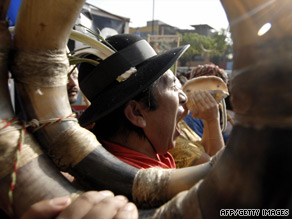Pope Alexander VI declared “by the authority of Almighty God,” “we” do “give, grant, assign to you and your heirs and successors, kings of Castile and Leon, forever, together with all their dominions, cities, camps, places, and villages, and all rights, jurisdictions, appurtenances, all islands and mainland found and to be found, discovered and to be discovered.”
There was only one “proviso” or limitation on the generous donation by the Holy See. None of the islands or main lands that the Spanish monarchs were authorized to seize could be “in the actual possession of any Christian king or prince.” It did not matter at all, however, that those lands were already in the possession of the original, non-Christian Indian nations because the Indians were portrayed as less than human. As recounted on “Democracy Now!,” there is an audio record of Peruvian police yelling in a dehumanizing manner, “Shoot the dogs in the head!” thereby referring to the Amazonian Indians as less than human.
Peru's indigenous win victory over lands
The 82-14 vote on Thursday with no abstentions came after five hours of intense debate.
Alas, one can find stories such as this one several times a month:
Year-old Legal Challenge to Border Wall Dies
The El Paso case grew out of former Department of Homeland Security Secretary Michael Chertoff’s waiver last year of more than 30 federal, state and local laws to speed up construction of border fencing in El Paso County, Texas, among other locations. Arguing that Secretary Chertoff did not have the statutory authority to issue the waivers, El Paso County and several co-plaintiffs filed suit against the federal government last June.
Our view: Congress needs to consider how barrier could disrupt binational culture
As O'odham tribal Chairwoman Vivian Juan-Saunders points out, what that means is that when the borderlands became part of two separate countries, Indians who were part of one cultural group ended up in two different nations.
Some 75 miles of the Mexico-Arizona border crosses the O'odham reservation. In modern times, tribal members have moved between the two countries using traditional routes with relative ease. A wall would create major problems for these native inhabitants.
"The fence they are discussing now would undermine all of our discussions and agreements with the Border Patrol and create undue harm to our land," Juan-Saunders said. "We need (cross-border) access to allow our members to seek health care, to participate in ceremonies and to engage in cultural processes."
For more on Peru, see The Amazon Tiananmen and "Sedition" and "Savages" in Peru. For more on colonialism in general, see Those Evil Europeans.


Defense of property rights wins out this time.
ReplyDelete